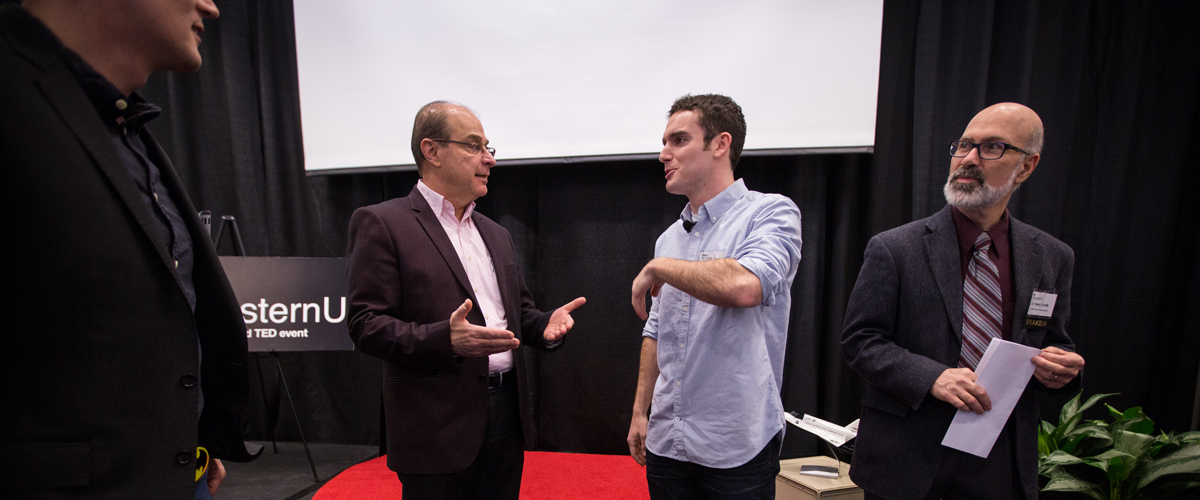by Greg St. Martin
Northeastern senior Justin Dowd said a revolution is coming in space flight—and he has a front row seat to prove it. In 2012, he won the international Race to Space competition offered through the global newspaper chain Metro in conjunction with Space Expedition Corporation, a private company known as SXC. Next year, he said, he’ll strap into the two-person rocket-powered spacecraft XCOR Lynx, blast off, and reach space in five minutes by traveling at 2,000 miles per hour.
Dowd, S’14, a math and physics combined major, said advancements in commercial space flight in the coming decades are primed to have major implications for travel, global commerce, science, the environment, and clean energy, which could be drawn from the sun and transmitted back to earth.
“The world is about to get a lot smaller. Orbital travel will allow you to set foot on the opposite side of the planet in two hours,” Dowd told about 100 Northeastern students—and many others watching online—on Saturday at TEDxNortheasternU, held in Raytheon Amphitheater. “Easy access orbit will give a whole new meaning to same-day delivery—and long-distance relationships.”
All of this, Dowd said, reinforces the idea that “an abyss of unknowns” still exists in the boundaries of knowledge across all subjects, from history to science. “That can only mean one thing: the world is not what it seems. It just can’t be. There are more questions than answers,” Dowd said.
Lead organizer Mary Tobin, DMSB’17, kicked off program by explaining how TEDxNortheasternU was born. In August, she tweeted to Northeastern President Joseph E. Aoun, suggesting that the university host the event. Aoun tweeted back that students should take the lead and run with the idea. From there, Tobin contacted Hugh Courtney, dean of the D’Amore-McKim School of Business, and the event started to take shape.
“I’m not suggesting that you tweet all your ideas to our wonderful president, but I am suggesting that you look for the nontraditional route,” she said.
In his introductory remarks, President Aoun spoke about the many myths that exist about higher education, including the myth that the majority of learners are traditional college students. He said transformative changes are taking place in higher education, and the 18– to 22-year-olds living on campus are no longer the majority. In fact, they make up only 15 percent of the today’s learners. The vast majority are non-traditional learners, a group that includes adults, part-time students, working professionals, and non-campus residents. This shift in particular, he said, will have major implications for the future of higher education; most institutions focus only the traditional 15 percent, but the 85 percent need an education system that adapts to their need too.
Another change, he said, is the onset of personalized education, the learning model of which is shifting from a teacher-centric system to a learner-centered system. “The future from this perspective is bright because the learners are in the driver seat, and the institutions that don’t adapt are going to disappear,” Aoun said.
TEDx events represent an initiative of the TED conference, which is devoted to the concept of “Ideas Worth Sharing.” TEDx events are independently organized, held all over the world, and designed to bring people together to learn about new ideas bubbling up in their local communities. TEDxNortheasternU featured a range of speakers who discussed their innovative ideas, research, and experiences—all of which dovetailed with the event’s theme, Unknown Knowns, aimed at promoting the exploration of ideas attendees may not realize they know. The event was primarily sponsored by Northeastern’s D’Amore-McKim School of Business.
Throughout the afternoon, several speakers discussed how their endeavors are having a positive impact on people’s lives. Northeastern alumnus Marquis Cabrera shared how his resolve, drive, and passion to transform the nation’s foster care system led him to found Foster Skills, a social enterprise focused on supporting and empowering foster children. Cabrera drew inspiration from the successes of other entrepreneurs and suggested that those interested in launching their own social ventures use a methodology he followed: business, impact, brand. He said social entrepreneurs must do their homework on the societal problems they aim to fix, develop a strategy for maximizing the effectiveness of their ventures, and realize that their startups are much more than a logo—rather, they’re an extension of the founders and must establish credibility to grow and gain support.
John Pepper, who founded the regional burrito chain Boloco in 1997, described his 2001 decision to break with conventional wisdom in the fast-food industry by raising the minimum wage for hourly employees. The risky move, he said, was the result of a change in his mindset. Instead of asking himself why people would work for such low wages and where a job like this could lead them, Pepper started thinking about how higher wages could transform his employees’ lives.
Raising wages, it turned out, also bolstered the company’s bottom line. “It’s incredible what happened. In the five years that followed, we had our best sales, our best profits, we earned the right to start growing again, and we even found some more investors,” he said.
Among the other speakers were Northeastern University psychology professor David DeSteno, whose research focuses on the role of emotion in social cognition and social behavior; Emily Green, CEO and chief lunch lady of Smart Lunches, Inc., an online meal service that helps families by bringing fresh, nutritious, high-quality meals to children; and Northeastern communication studies major Amy Henion, AMD’14, whose passion for design and sustainable living has inspired her to build her own tiny house within the next five years in order to attain housing security, lessen dependence on material goods, and diminish her impact on the environment.
The TEDxNortheasternU talks will soon be posted to the TEDx YouTube page.
Originally published in news@Northeastern on January 27, 2014.

